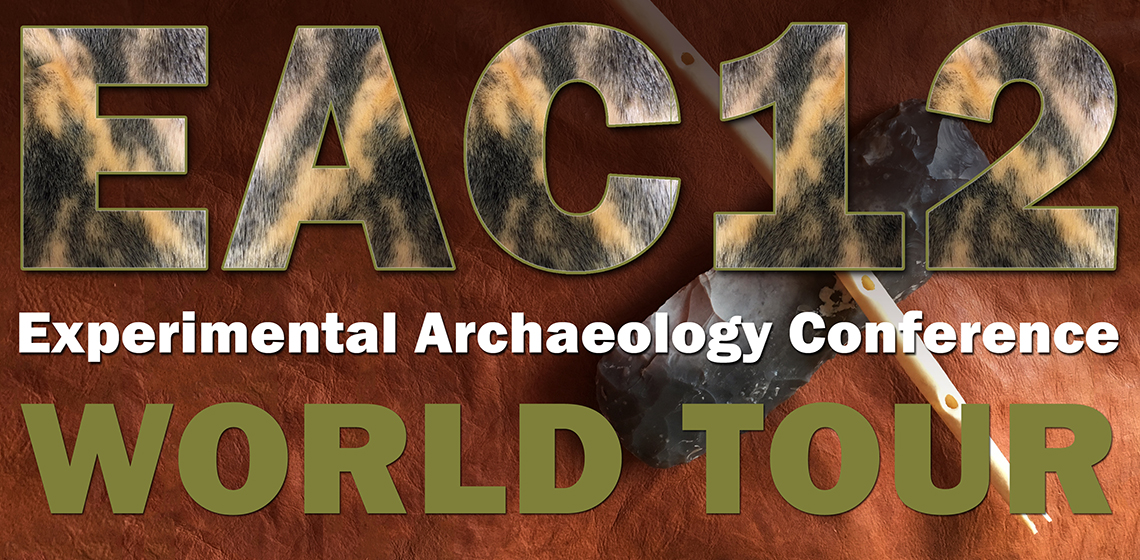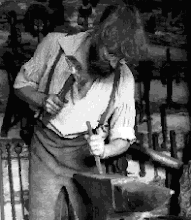Join the #EAC12 Conference live and for Free
" Attending the #EAC12 Experimental Archaeology world tour online conference is free and open access to all, thanks to our sponsors. You will see over 120 experiments from around the world, in 16 sessions spanning over 4 days (29 March - 1 April). The Conference will be streamed live on YouTube via https://www.youtube.com/c/ExarcNetofficial
Each 3-hour session has two hours of presentations, followed by a 1 hour of live Q&A where questions from the public are answered.
Besides that, we have a "plus" platform, Discord. Here you can interact with one another in thematic text and audio channels. Follow this link to enter the server: https://discord.gg/MJTUwc8 any time before or during the conference. Once you click, you are prompted to present yourself in 1, 2 sentences and then one of us will let you in. Read more about Discord... "
Please register for free to receive updates about the #EAC12 Conference.
Program Selections
Note : This is just my own personal selection of topics I am interested in!
Papers directly related to Iron Smelting in bold / Presentation times adjusted for EST (Ontario), as pulled off the published schedule : https://exarc.net/meetings/eac12
For all Abstracts see https://exarc.net/meetings/eac12/abstracts
IMPORTANT CORRECTION (AGAIN!)
I messed up on the reporting and converstion!
(March 30) When the schedule was first published, the normal offset from GMT to EST (Ontario) of 5 hours was given here. Then Ontario shifted to Daylight Savings, which through everything out by an hour (less). So I changed the indicated times. Then two weeks later, Europe shifted to DST as well, re-aligning the times back to +5 hours.
ALL TIMES BELOW NOW CORRECT FOR ONTARIO
Monday March 21
11 AM EDT (London GMT 16:00) - Session 3
#7 : (11:00)
Hotspot Presentation: Experiments in functional Studies. The case of fire-related Experiments
Veerle Rots, Dries Cnuts, Sonja Tomasso
TraceoLab/Prehistory, University of Liège (Belgium)
#8 : (11:00 +)
Paper: 4-Dimensional Recording of Fire related Experiments
Ole Fredrik Unhammer & S.J. Armitage
Centre for early sapiens behaviour (SapienCE), Department of Archaeology, History, Cultural Studies and Religion, University of Bergen (Norway)
15:00 EDT (London GMT 20:00) - Session 4
#10 (15:00)
Paper: Toxic Taters: how Ethnography, Experimental Archaeology and the modern Kitchen can improve the safety Potatoes
Bill Schindler
Washington College (USA)
#11 : (15:00 +)
Paper: How the Wind Blows: Investigating the Performance of Early Bellows through Experiments
Myriam Legault
Ruhr-Universität Bochum (Germany)
Paper: A lot of Hot Air: Exploring Air Production in Viking Era Bellows
Neil Peterson
Independent Scholar (Canada)
Session 4: Live Questions & Answers
(starting approximately after 2h of broadcasting = 17:00 EDT)
Tuesday 30 March
04:00 EDT (London GMT 09:00) - Session 6
# 16 : (04:00 +)
Paper: Experimental Casting of high-leaded bronze Palstaves in the ATLANTAXES Project
Beatriz Comendador1, Aaron Lackinger1, María G. Faro2, Noemí Silva2, Pau Sureda2 & Xosé-Lois Armada2
1 Grupo de Estudos de Arqueoloxía, Antigüidade e Territorio, Universidade de Vigo (Spain)2 Institute of Heritage Sciences (Incipit - CSIC) (Spain)
#17 : (05:00)
Paper: A House Biography: Building and Burning an Experimental Reconstruction of a Neolithic House
Diederik Pomstra, Annelou van Gijn, Annemieke Verbaas & Leo Wolterbeek
800 EDT (London GMT 13:00) - Session 7
#20 : (09:00 +)
Paper: Arctic Iron Smelting in northernmost Sweden – an Experimental Approach
Carina Bennerhag1,2, Jannica Grimbe1 & Daryoush Tahmasebi1
1 Norrbottens museum (Sweden)
2 Luleå University of Technology (Sweden)
Wednesday March 31
03:00 EDT (London GMT 08:00) - Session 9
#26 : (03:00)
University of Exeter / Buster Farm Hotspot
Paper: Butser Ancient Farm and Exeter University Collaborative Experiment for Alternative Roofing Materials
Fergus Milton (UK)
#27 : (05:00+)
Paper: Experimental Research and the Archaeological Open-Air Museum: perfect Storm or a perfect Partnership?
Claire Walton
Butser Ancient Farm (UK)
Thursday April 1
00:00 EDT (London GMT 05:00) - Session 13
#37 : (00:00+)
Paper: Investigating the Ancient Heritage of Indian Iron Smelting Technology through Experimental Approach
S. Udayakumar
National Institute of Advanced Studies (NIAS) (India)
04:00 EDT (London GMT 09:00) - Session 14
#41 : (05:00+)
Paper: Roman and Early Medieval Mosaic Beads and Millefiori Canes – the hot Glass Techniques of Manufacture
Sue Heaser (UK)
#42 : (0:600)
Paper: Why Recycle Glass? The Answer is Clear? Experimental Glass Recycling using a Wood-fired Glassworking Furnace
Victoria Lucas
Newcastle University (UK)
08:00 EDT - (London GMT 13:00) Session 15
#43 : (08:00)
DARC Hotspot Presentation
(08:00) Paper: 'Now with 70% less Clay!' Experiments with Viking Age Icelandic Turf walled Iron Smelting Furnaces
Darrell Markewitz1, Kevin Smith2 & Neil Peterson3
1 Independent Researcher, Ontario (Canada)
2 Haffenreffer Museum of Anthropology, Rhode Island (USA)
3 Independent Researcher, Ontario (Canada)
Paper: Stone Soup: Experiments in Soapstone Cookware in a Norse Context
Richard Schweitzer & Sarah Scroggie
Dark Ages Recreation Company (Canada)
Paper: Increasing the Effectiveness of the Bloomery Smelting Process by using a mobile Furnace Shaft. Archaeological Experiments on the possible Reuse of clay Shafts during the early Roman Period in Northern Central Europe
Florian Kobbe2, Christian Helmreich1,2,3, Jan Hinrichs1 & Martin Sauerwein1
Session 15: Live Questions & Answers
(starting approximately after 2h of broadcasting = 10:00 EDT)
As a European based conference, the times for some sessions are not ideal for those of us in North America.



















